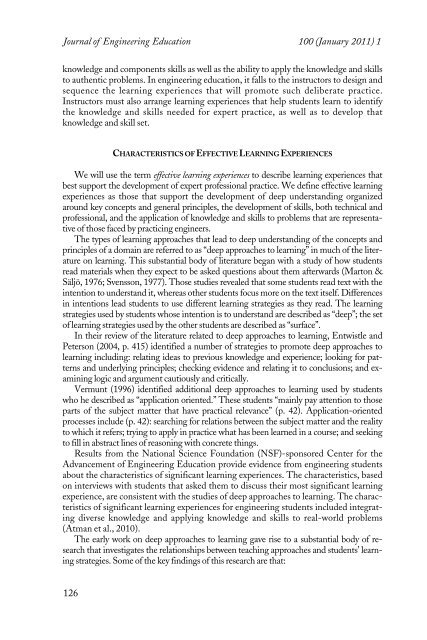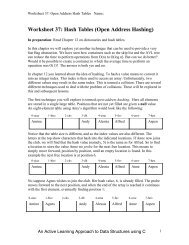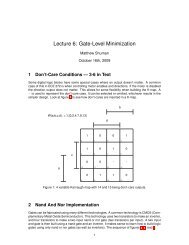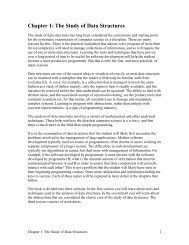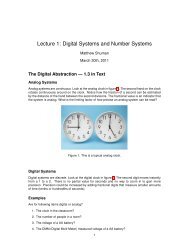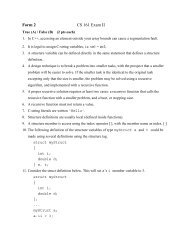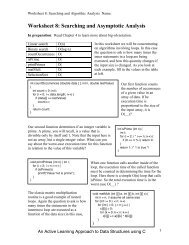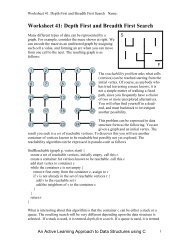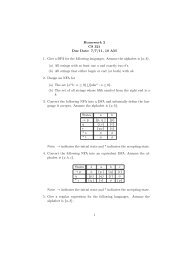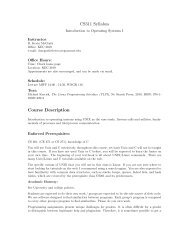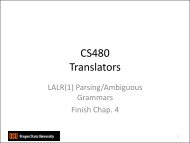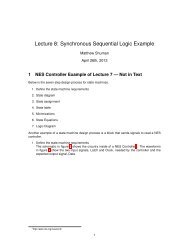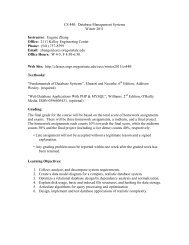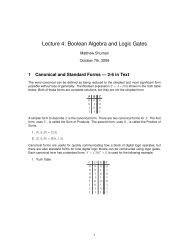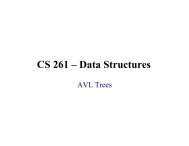Engineering Education and the Development of Expertise - Classes
Engineering Education and the Development of Expertise - Classes
Engineering Education and the Development of Expertise - Classes
Create successful ePaper yourself
Turn your PDF publications into a flip-book with our unique Google optimized e-Paper software.
Journal <strong>of</strong> <strong>Engineering</strong> <strong>Education</strong> 100 (January 2011) 1<br />
knowledge <strong>and</strong> components skills as well as <strong>the</strong> ability to apply <strong>the</strong> knowledge <strong>and</strong> skills<br />
to au<strong>the</strong>ntic problems. In engineering education, it falls to <strong>the</strong> instructors to design <strong>and</strong><br />
sequence <strong>the</strong> learning experiences that will promote such deliberate practice.<br />
Instructors must also arrange learning experiences that help students learn to identify<br />
<strong>the</strong> knowledge <strong>and</strong> skills needed for expert practice, as well as to develop that<br />
knowledge <strong>and</strong> skill set.<br />
CHARACTERISTICS OF EFFECTIVE LEARNING EXPERIENCES<br />
We will use <strong>the</strong> term effective learning experiences to describe learning experiences that<br />
best support <strong>the</strong> development <strong>of</strong> expert pr<strong>of</strong>essional practice. We define effective learning<br />
experiences as those that support <strong>the</strong> development <strong>of</strong> deep underst<strong>and</strong>ing organized<br />
around key concepts <strong>and</strong> general principles, <strong>the</strong> development <strong>of</strong> skills, both technical <strong>and</strong><br />
pr<strong>of</strong>essional, <strong>and</strong> <strong>the</strong> application <strong>of</strong> knowledge <strong>and</strong> skills to problems that are representative<br />
<strong>of</strong> those faced by practicing engineers.<br />
The types <strong>of</strong> learning approaches that lead to deep underst<strong>and</strong>ing <strong>of</strong> <strong>the</strong> concepts <strong>and</strong><br />
principles <strong>of</strong> a domain are referred to as “deep approaches to learning” in much <strong>of</strong> <strong>the</strong> literature<br />
on learning. This substantial body <strong>of</strong> literature began with a study <strong>of</strong> how students<br />
read materials when <strong>the</strong>y expect to be asked questions about <strong>the</strong>m afterwards (Marton &<br />
Säljö, 1976; Svensson, 1977). Those studies revealed that some students read text with <strong>the</strong><br />
intention to underst<strong>and</strong> it, whereas o<strong>the</strong>r students focus more on <strong>the</strong> text itself. Differences<br />
in intentions lead students to use different learning strategies as <strong>the</strong>y read. The learning<br />
strategies used by students whose intention is to underst<strong>and</strong> are described as “deep”; <strong>the</strong> set<br />
<strong>of</strong> learning strategies used by <strong>the</strong> o<strong>the</strong>r students are described as “surface”.<br />
In <strong>the</strong>ir review <strong>of</strong> <strong>the</strong> literature related to deep approaches to learning, Entwistle <strong>and</strong><br />
Peterson (2004, p. 415) identified a number <strong>of</strong> strategies to promote deep approaches to<br />
learning including: relating ideas to previous knowledge <strong>and</strong> experience; looking for patterns<br />
<strong>and</strong> underlying principles; checking evidence <strong>and</strong> relating it to conclusions; <strong>and</strong> examining<br />
logic <strong>and</strong> argument cautiously <strong>and</strong> critically.<br />
Vermunt (1996) identified additional deep approaches to learning used by students<br />
who he described as “application oriented.” These students “mainly pay attention to those<br />
parts <strong>of</strong> <strong>the</strong> subject matter that have practical relevance” (p. 42). Application-oriented<br />
processes include (p. 42): searching for relations between <strong>the</strong> subject matter <strong>and</strong> <strong>the</strong> reality<br />
to which it refers; trying to apply in practice what has been learned in a course; <strong>and</strong> seeking<br />
to fill in abstract lines <strong>of</strong> reasoning with concrete things.<br />
Results from <strong>the</strong> National Science Foundation (NSF)-sponsored Center for <strong>the</strong><br />
Advancement <strong>of</strong> <strong>Engineering</strong> <strong>Education</strong> provide evidence from engineering students<br />
about <strong>the</strong> characteristics <strong>of</strong> significant learning experiences. The characteristics, based<br />
on interviews with students that asked <strong>the</strong>m to discuss <strong>the</strong>ir most significant learning<br />
experience, are consistent with <strong>the</strong> studies <strong>of</strong> deep approaches to learning. The characteristics<br />
<strong>of</strong> significant learning experiences for engineering students included integrating<br />
diverse knowledge <strong>and</strong> applying knowledge <strong>and</strong> skills to real-world problems<br />
(Atman et al., 2010).<br />
The early work on deep approaches to learning gave rise to a substantial body <strong>of</strong> research<br />
that investigates <strong>the</strong> relationships between teaching approaches <strong>and</strong> students’ learning<br />
strategies. Some <strong>of</strong> <strong>the</strong> key findings <strong>of</strong> this research are that:<br />
126


